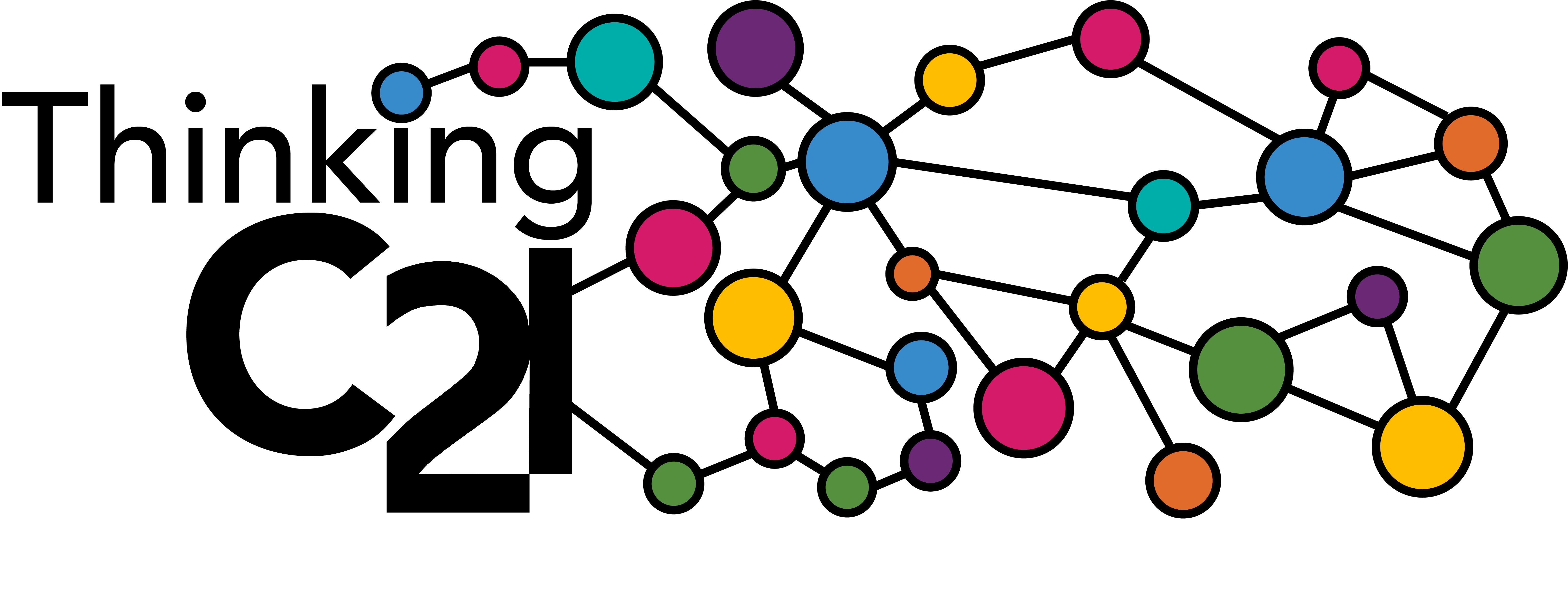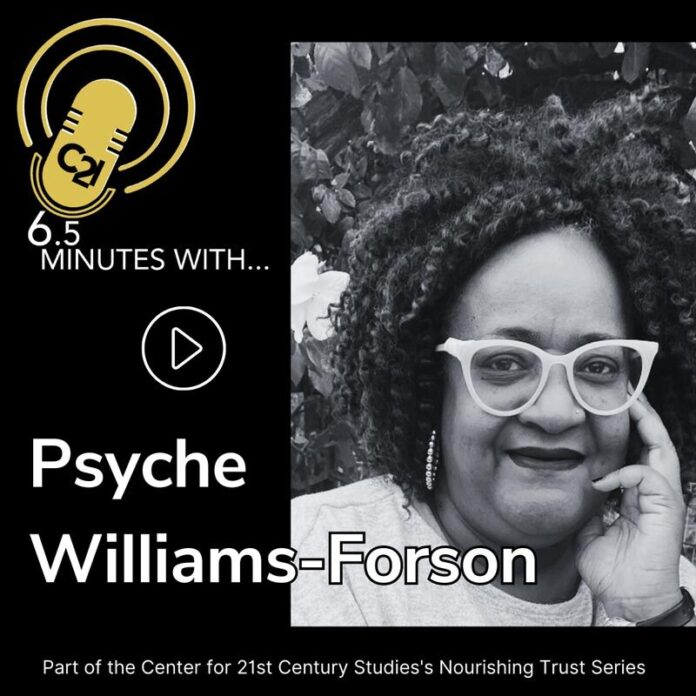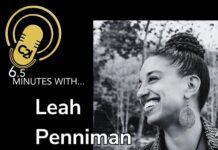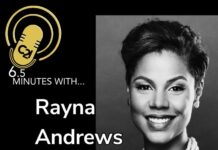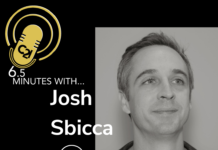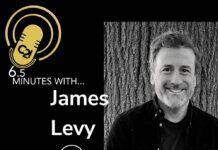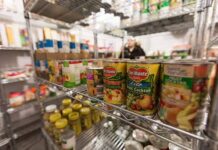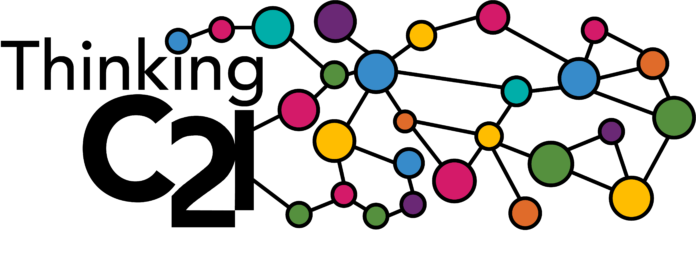American Studies professor Psyche Williams-Forson talks about her most recent book project and the importance of digging deep into understanding individual food choices. You can find her most recent book, Eating While Black: Food Shaming and Race in America, here.
Transcript of the podcast:
Randolph Marcum:
You’re listening to 6.5 Minutes with C21, an audio introduction to the topics, experts, and leaders who take part in the conversations hosted by the Center for 21st Century Studies. I’m Randolph Marcum, a graduate fellow at C21. And in this episode, Deputy Director Nicole Welk-Joerger interviews Dr. Psyche Williams-Forson. Williams-Forson is a professor and Chair of the Department of American Studies at the University of Maryland College Park, and the author of Eating While Black: Food Shaming and Race in America.
Nicole Welk-Joerger:
How did you get to your most recent project, Eating While Black: Food Shaming and Race in America?
Psyche Williams-Forson:
I came to this project because of my first book, Building Houses Out of Chicken Legs. While I was fortunate enough to be touring nationally and internationally to talk about that book, a lot of changes were taking place in America, or in the U.S, around food, right? It was a sort of reclamation of the counterculture of the 60s, right? And so everyone was talking about good food, and healthy food, and gardening was becoming really big, but the word that was being used was farming. Everyone wanted to farm. All of these things were starting to happen, and the conversations that the folks were engaging in with me were more and more judgemental, quite frankly. How do we get people to stop eating fast food? How can we put a garden in this community? The greatest thing you can do is put your hands in the soil. So just a lot of proclamations were coming up that had me really questioning — not so much what was happening in terms of movements because movements are cyclical, right? They come they go. But what was happening with the sort of moralism that was being assigned to these food conversations, and proclamations, and declarations, right? When you set up these kinds of down-bitish claims, you miss the nuance and you disregard the context. And so, I felt that there was a need for us to have the conversation, but open it up so that we aren’t starting at a deficit and shaming place, but that we were understanding everyone’s different way of life. You know, people eat in different ways for different reasons. And just because a person eats healthy — quote-unquote — that means fruits and vegetables in this context does not mean that they are healthy because what we were doing, and what we are doing, is extracting food from the rest of our lives as if food somehow makes us different, right? And so, we live in a society where we don’t have equitable access to food. So the conflation of all of these types of events really propelled me to wanna write about: let’s have a bigger conversation, and stop with the sound bites and the slogans because, at its core, those things tend to be fundamentally anti-Black.
Nicole Welk-Joerger:
You describe yourself as a scholar of Black life with a particular focus on food and footways. What does studying and following food do for you in your work?
Psyche Williams-Forson:
Food allows me to go into the interior, and then come back out to ask questions about the content, right? By studying what people eat, when they eat, how they ate, I can learn a lot about the cultural moments in which they’ve lived the political issues, the economic issues, the psychological goings on, the philosophical goings on. And so food does an immense amount of work when you’re studying it from that perspective. I was largely self-taught in this area because while there had been writings in anthropology and many others in American, and a few in American Studies, there was nowhere that food was largely being studied. Food studies was still burgeoning as a field. And so, that was wonderful on the one hand because that meant I had to read around disciplinary to build an understanding. Of course, it was frustrating as well because I had to build an understanding. But what emerged was a sub-field in Black food study. And I’m excited to have been a part of, or even one of the leading voices in shaping that conversation.
Nicole Welk-Joerger:
What is your definition of food justice?
Psyche Williams-Forson:
Food justice to me, it’s about understanding, recognizing, and respecting people’s food choices. We know that we don’t live in an equitable food society. How do we allow people to thrive with food in the meantime? I’m all for the movements and the push that we have to do to change the agro-industrial food system to encourage more people to grow their own food, encourage more people to access fresh and obtainable, wholesome food. But what do we do in the meantime while folks are trying to figure that out? To me, it’s respecting that a person may have to — and may want to, more importantly — access food from the Dollar Tree, or at the local bodega, or the local corner store because that’s where they feel most comfortable. That’s about food justice. Yes, it boils down to a systemic and systematic set of inequities, absolutely. But I want us to be sure not to perpetuate those inequities on a personal level by insisting that people have to eat in ways that we think are most appropriate because we fought for their struggle and their right to do so. See, sometimes we want to do the hard work that works for us, and recognizing that just because it works best for you, doesn’t mean that it works best for other people. And this is especially the case in honoring food traditions. So, I may disagree that you want to eat burgers and drink Cokes every day — I don’t think it’s healthy, it will lead to all kinds of health issues, correct. And let’s talk about the fact that you tend to eat by yourself every day. And so, you’re seeking comfort in that particular food. Let’s talk about the fact that you are not worried about end of life, but you’re conscious of end of life and that’s driving, you know, and there’s stress involved for you there. Let’s talk about the fact that you may not have money to retire on. Let’s talk about the fact that, you know, you may not have family. Let’s talk about how do you thrive? If food is the only thing enabling you to do that, then I’m problematic for trying to change something that is the only anchor you have to this way of living. We very rarely go to that level, right? We don’t go that deeply into the conversation. We stay at the surface level and just say that food is bad for you. But let’s talk about what’s happening in my life right now that has me at this place right here where this is what’s sustaining me the most, whether you will like it or not, whether you agree with it or not.
Randolph Marcum:
To further engage with this interview, please visit our website at uwm.edu/c21. If not there, we hope to catch you when you have another 6.5 Minutes to spare.
